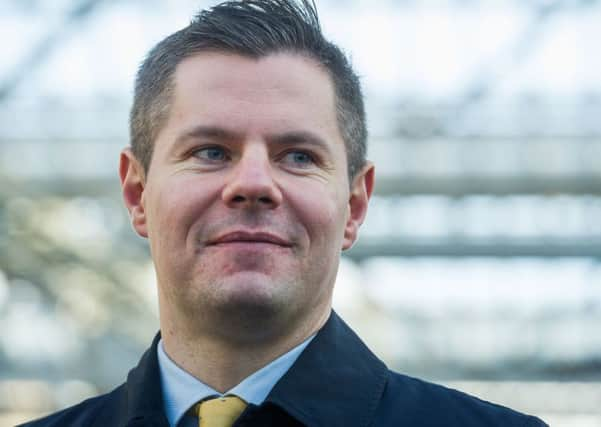Scott Macnab: Scotland's historic new powers bring tax dilemma


Political warfare has been raging in recent months to claim the left-of-centre ground in Scottish politics, with some opposition parties outbidding themselves to push for higher taxes to help ease the impact of austerity. Labour is leading the way, demanding the top rate for the country’s highest earners to be increased from 45p to 50p, as well as calling for a 1p rise in the basic rate to be paid by all Scots workers. On the other side, the Conservatives say that tax rates must be kept in line with the UK level.
It’s a delicate balance. Scotland’s highest earners, who pay the current 45p top rate of tax, represent less than 1 per cent of working Scots – but they account for 14 per cent of all taxes, in terms of rvenue. If they sense a political consensus for higher taxes in Scotland vis-a-vis the rest of the UK, it won’t take long before they either move or change the way they are paid – with the public purse missing on those much-needed revenues altogether.
Advertisement
Hide AdAdvertisement
Hide AdAnd of course the top rate in the UK is actually well below the European Union, OECD and global averages, although comparable advanced economies such as France, Germany and the US all have higher rates. The SNP is currently going down the middle ground.
A proposed extension of the threshold for the 40p rate of income tax south of the Border to those earning £50,000, from the current level of about £43,000 by the end of this parliament, will not be implemented in Scotland.
This measure alone is unlikely to prove enough to drive people out or even deter workers from elsewhere in the UK from settling in Scotland, although some higher-rate tax payers could face paying up to an extra £800 a year.
What perhaps matters more is the principle that Scotland now becomes the highest taxed part of the UK.
That makes business nervous. Johnston Carmichael, Scotland’s biggest independent firm of chartered accountants, recently set out “concerns over the prospect of a ‘divergence’ in tax rates making Scotland a less “attractive location for business”. They even warned that some of their clients were ready to move if the situation become prohibitive north of the Border.
The biggest dilemma facing Mr MacKay is to stave off the prospect of another showdown with local council chiefs who fear that services face another swingeing round of cuts after town hall budgets were reduced by up to £500 million last year.
First Minister Nicola Sturgeon has already stated that councils will get a “fair deal” this time around, but Mr Mackay has limited wriggle room. The Scottish Government is facing a fall in its block grant from Westminster of £800m between now and the end of the decade.
At the same time, the SNP is committed to a series of high-profile policy manifesto commitments, including an increase in spending on the NHS of £500m and £500m on the introduction of an effective full-time system of childcare during this Parliament. Police and teacher numbers are also to be protected.
Advertisement
Hide AdAdvertisement
Hide AdSomething has to give and councils chiefs – whose budgets do not fall under the “protected” umbrella are already fearing the worst.
That could mean bin collections, some education services, social care visits, libraries and local sports facilities all suffer. The prospect of a £700m cut between now and the end of the decade was raised in a Fraser of Allander Institute report earlier this week.
One area where ministers have been feeling acute political pressure in recent weeks has been in transport. Soaring delays and cancellations on Scotland’s rail network have even led to some calls for transport minister Humza Yousaf to be removed from his post.
Labour say that hard-pressed passengers have suffered enough and a rail price freeze should be implemented. At at time when both the First Minister and Mr Yousaf have admitted the performance of Scotland’s railways are “unacceptable”, it may prove awkward for the First Minister to justify the 2.3 per cent hike which is currently proposed.
And a growing consensus is emerging on the need for a step-change in the treatment of mental health issues in Scotland, which may mean millions of pounds in extra investment to bring services up the standards which are now expected.
The dilemma for Mr MacKay lies in balancing these demands with using the fiscal levers at his disposal to revive Scotland’s flagging economy.
The new powers mean that his budget will become entwined with Scottish economic performance.
If this is buoyant and more people are in work, then taxes roll in. But faced with the current flatlining situation which has seen barely marginal growth in the past year and a yawning gap emerge between Scotland’s economy and the growth rates south of the Border, then things aren’t going to be so rosy – especially as a further three years of “below trend growth” is now being predicted by economists.
Advertisement
Hide AdAdvertisement
Hide AdThis is where the real shifting plates of Scottish politics may emerge in the years ahead. It’s not just income tax, but other levers like business rates, land and buildings transaction tax and Air Passenger Duty which could be utilised. As the SNP point to Brexit and the slump in oil prices for the economic woes, opposition partes will be quick to remind them they increasingly have the powers to do something about it.
